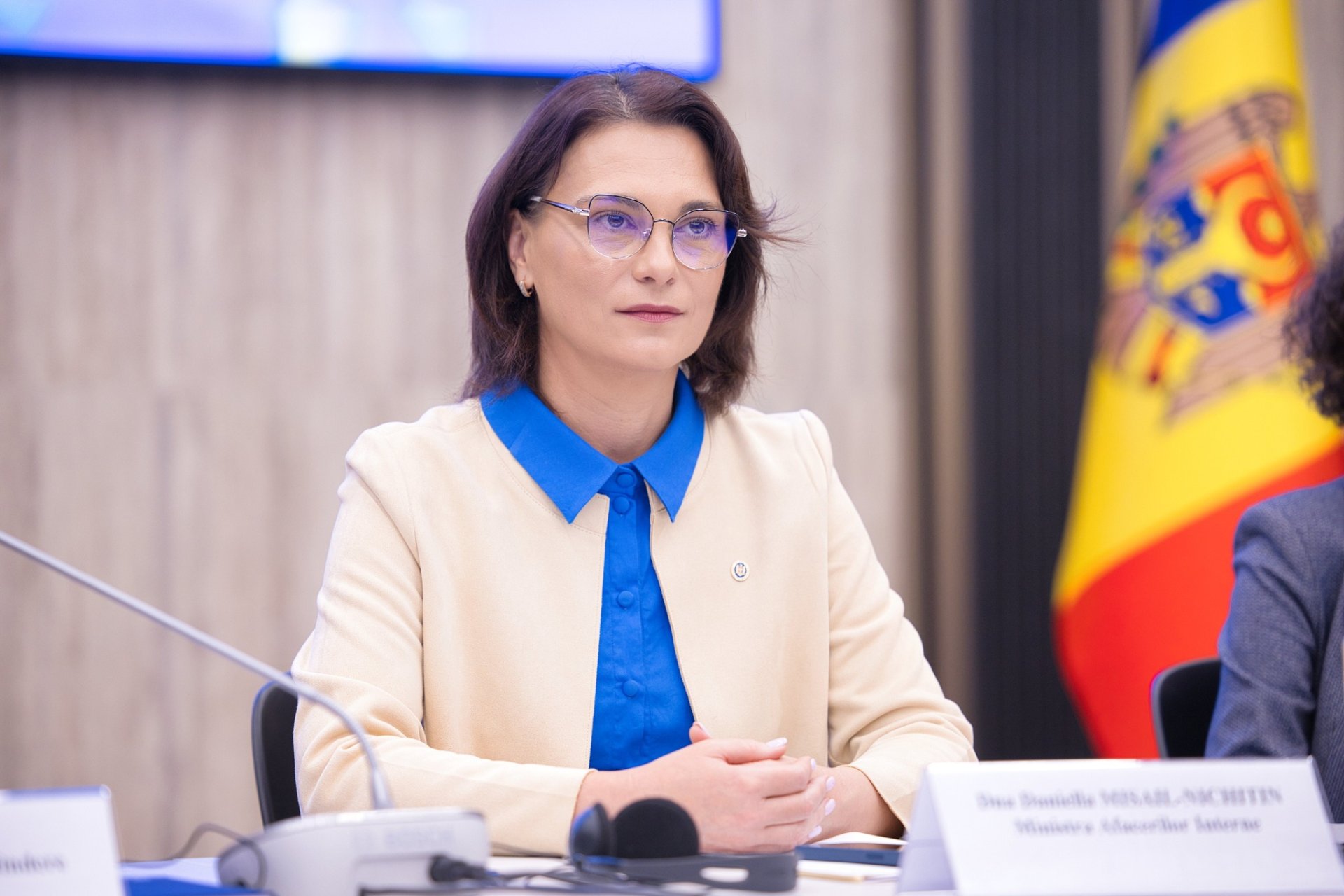
MOLDPRES interview // Minister of Internal Affairs: Moldova experiencing wave of concerted attacks from abroad and supported by criminal groups
Minister of Internal Affairs Daniella Misail-Nichitin gave an exclusive interview to MOLDPRES State News Agency. The official talked about the strategic cooperation platforms between the Ministry of Internal Affairs and European institutions, MD-ALERT system and 112 Emergency Service, the corruption index among police officers, attempts to destabilize in the context of parliamentary elections, and electoral bribery schemes.
MOLDPRES: The Republic of Moldova is in the process of joining the European Union. At this important stage, what are the strategic cooperation platforms between the Ministry of Internal Affairs and the European institutions? What tangible results do they bring to citizens?
Daniella Misail-Nichitin: First of all, I want to thank you for your interest in the internal affairs system and its developments. Four years ago, the Republic of Moldova was practically isolated; today, cooperation with European and international partners has become a norm. Every day, joint teams of police officers, border police, carabinieri, migration or emergency specialists work side by side with their counterparts from EU member states and agencies such as Europol, Frontex or Cepol.
This is perhaps the strongest proof of our trust and professionalism. Moldovan specialists manage complex cases 24/7 together with European partners, and the exchange of information has doubled—in some areas, even tenfold. No European state would share sensitive data if it did not have complete confidence in our ability to uphold democratic principles and protect this information.
Over the past four years, since the resumption of cooperation, our approach alongside our development partners has been clear: defining operational priorities and identifying resources to achieve them.
Thus, we focused on increasing intervention capacities:
- Four years ago, mobility was below 30%; today, we have increased it by 2.5 times;
- In the past, employees used personal phones for reporting; today almost everyone is equipped with Tetra stations, ensuring encrypted communication and working even if mobile networks go down;
- Initial and ongoing training has tripled—employees are trained not only in classic methods but also in new fields: trace fixing, use of genetic and biometric data, OSINT analysis, cybercrime, geospatial analysis;
- Using drones, thermal imaging equipment, smart border sensors, and service dogs for drugs and counterfeit money has become normal;
- We have modernized working conditions and employee security: over 65,000 square meters of offices renovated or built, better equipment, and minimum security areas provided by law.
The results have been immediately felt and became clear for citizens:
- Minor offenses decreased by 30%, and property crimes by 25%—from 11,203 in 2021 to 8,401 in 2024;
- Crimes against life and health decreased by 5%, from 819 to 721;
- In just the first half of 2025, minor offenses decreased by almost 59%, property crimes by 9%, and crimes against life and health by 4.5%;
- Road traffic accidents decreased by 20.7%, the number of fatalities by 18.6%, and injuries by 17.1% (over four years);
- Decisions to declare foreigners undesirable in the territory of the Republic of Moldova increased by 108%.
Control over the territory has also improved significantly: border security increased by 40%, and cigarette and tobacco product seizures increased from 22 in 2021 to 9,226 in 2024.
Moreover, in the last four years, cooperation with European and international partners is not just an exchange of experience but also a significant investment in the safety of our citizens. If we look at the numbers, we see the clear extent of the support: 313.4 million euros have been attracted thanks to the development matrix and external partners, over 220 million of which have already been invested—money spent on equipment and infrastructure. This joint effort has allowed us to speed up the modernization of the Ministry of Internal Affairs, align our standards with those of Europe, and provide the public with safer and more efficient services.
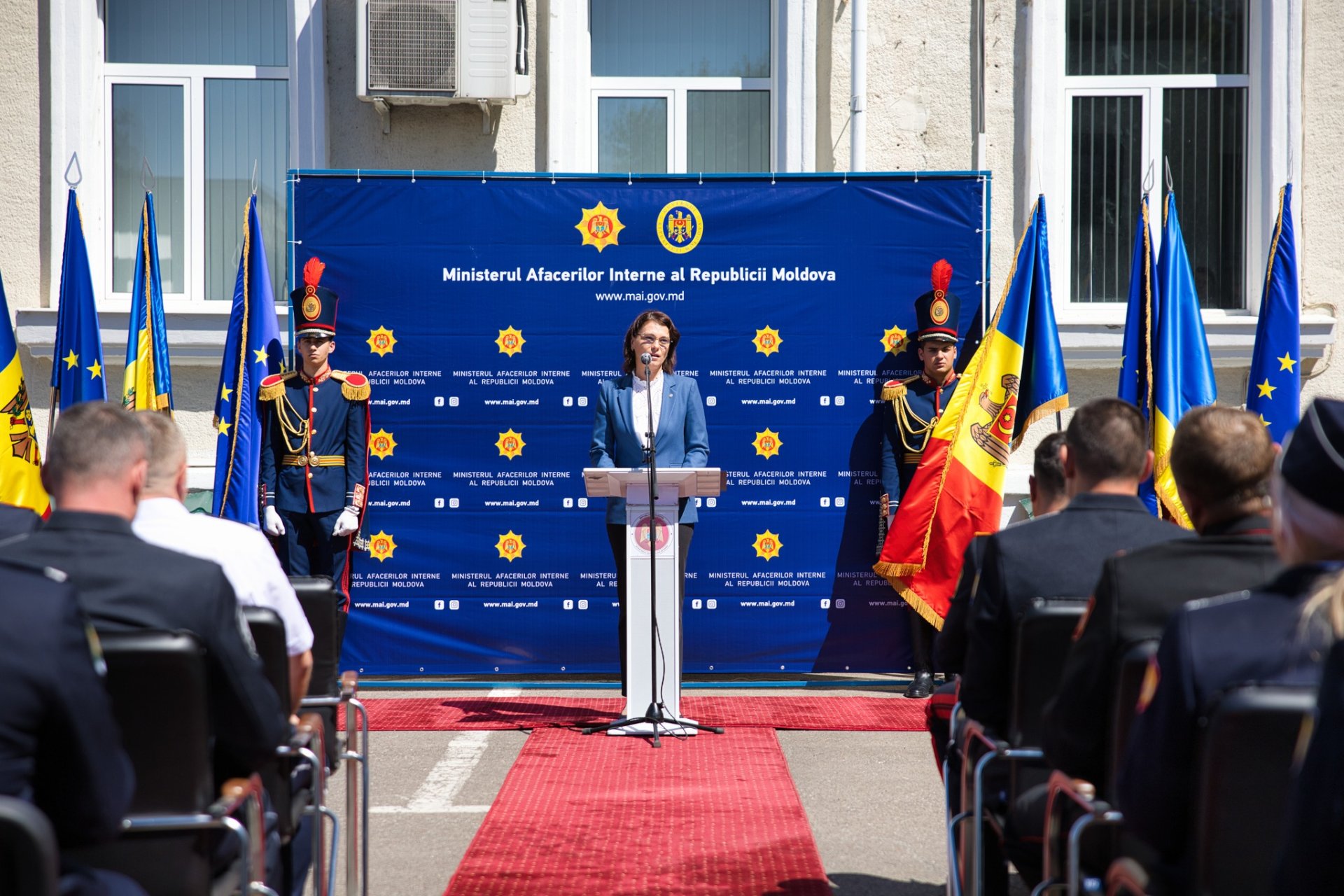
Constant partners we collaborate with include: the European Commission (DG HOME and DG NEAR), European agencies such as Europol, Frontex, Cepol, as well as institutions, structures, or cooperation mechanisms like Interpol, EUDA, EUBAM, EMPACT, the European Civil Protection Mechanism, the EU Security Hub in Chișinău, the EU4Moldova and EU4Security programs, and the Together 4 Home Affairs (T4HA) platform. Together, these structures have created a solid framework of cooperation that delivers concrete results for citizens.
Regarding the European Commission's contribution, the results are already visible: modern forensic laboratories, advanced IT systems, specialized courses for employees and judicial authorities, and rapid response mechanisms for complex incidents. Citizens directly feel these investments through increased protection, quicker interventions, and more professional services. I want to mention that all these collaborations with European and international institutions, platforms, programs, and projects have transformed the Ministry of Internal Affairs into a modern, efficient, and resilient institution.
For citizens, the tangible results compared to 2021 include a 30% decrease in minor offenses and 25% in theft, a decrease of over 20% in road accidents and victims, the strengthening of borders with a 40% increase in control, the documentation of over 20,000 migrants, and the seizure of thousands of illegal shipments and quick and professional responses in emergencies, and more secure and transparent public services.
We can confidently say today that the Republic of Moldova is no longer an isolated state, but a trusted partner of the European Union and developed states in the field of security and integration. Every step taken on this path means more stability, protection, and confidence for our people.
MOLDPRES: President Maia Sandu previously signaled the involvement of the criminal world in possible destabilizing actions aimed at influencing political and electoral processes in the Republic of Moldova. What information does the Ministry of Internal Affairs have on this issue, and how do you intend to intervene in the event of organized destabilizations?
Daniella Misail-Nichitin: The Republic of Moldova is going through a wave of concerted attacks coming from abroad and supported by internal criminal groups. The target of these actions is our democracy and the European path we have chosen together.
Russia daily launches falsehoods and disinformation, openly attacking our European progress and the decisions expressed at the national referendum. At the same time, Shor criminal group, an instrument of Moscow, floods social networks with manipulations and AI-generated messages to sow confusion and incite people to violent protests paid with dirty money. These practices endanger the peace and security of each of us.
I want to be very clear: the state reacts. Police and carabineers are permanently on the streets for people's safety. Our institutions investigate, conduct searches, and apply sanctions, and there are also exchanges of information with international partners. I want to send a very clear message that the Law will be applied without concessions.
Those who destabilize the Republic of Moldova or accept being used by criminals must know that they will be held accountable by the law. Authorities will respond firmly to any challenge because peace and safety for citizens are not negotiable.
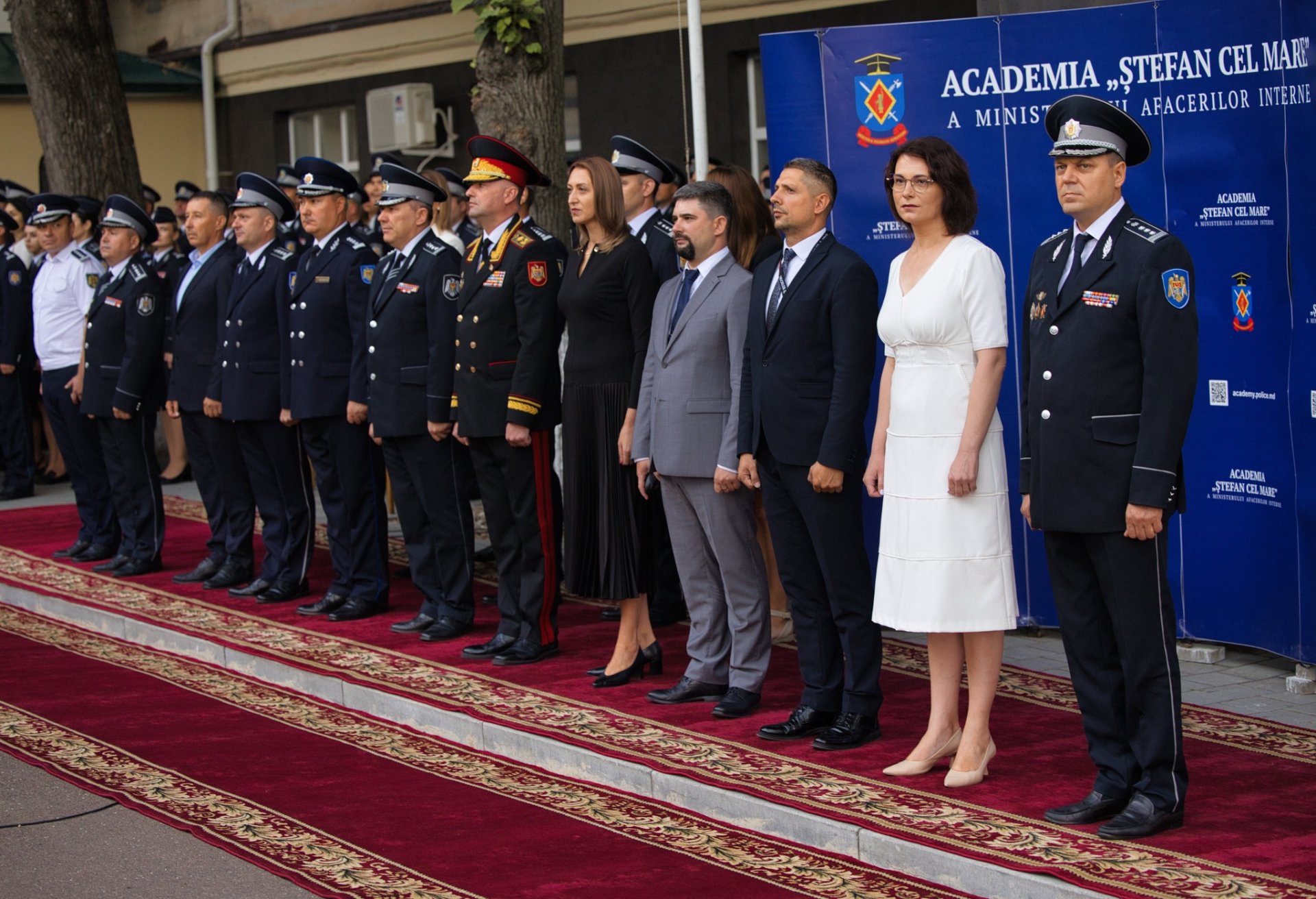
MOLDPRES: MD-ALERT system will be implemented in Moldova to broadcast messages to warn the population in case of extreme weather events and risk situations. Alerts will be sent through mobile telecommunication networks. At present, at what stage is the project, and when will it become functional?
Daniella Misail-Nichitin: MD-ALERT system is a very important step for each of our safety. Practically, it will allow in risk situations—extreme weather events, major accidents, or other emergencies—to immediately receive warning messages directly on the mobile phone through operator networks. The goal is to reach each person so that people can react in time and protect themselves.
We have completed the feasibility study, and we are now in the second phase of the project. In 2026, acquisitions, installations, and necessary configurations will take place, and the MD-ALERT system will be fully operational by the end of 2027, according to Moldova's National Accession Program to the EU 2025-2029.
MOLDPRES: The Republic of Moldova and Romania initiated a partnership this spring to improve 112 emergency services, aiming to increase operational capacities and reduce waiting times. What will change in the provision and management of this service?
Daniella Misail-Nichitin: The partnership we initiated with Romania to modernize the 112 service means, first and foremost, more safety and a faster reaction for citizens. People will feel that when they dial 112, waiting time decreases, and the authorities' response comes quicker and better coordinated. The difference will be clear: a friendlier, faster, more efficient 112 service with a high level of professionalism.
This agreement allows us to apply the best European practices, train teams, and use modern technologies, ensuring that each call is handled efficiently, whether we are talking about fires, accidents, medical emergencies, or cross-border situations. With the support of Romania's partners, we manage to bring European standards to the emergency services that benefit every family in the Republic of Moldova.
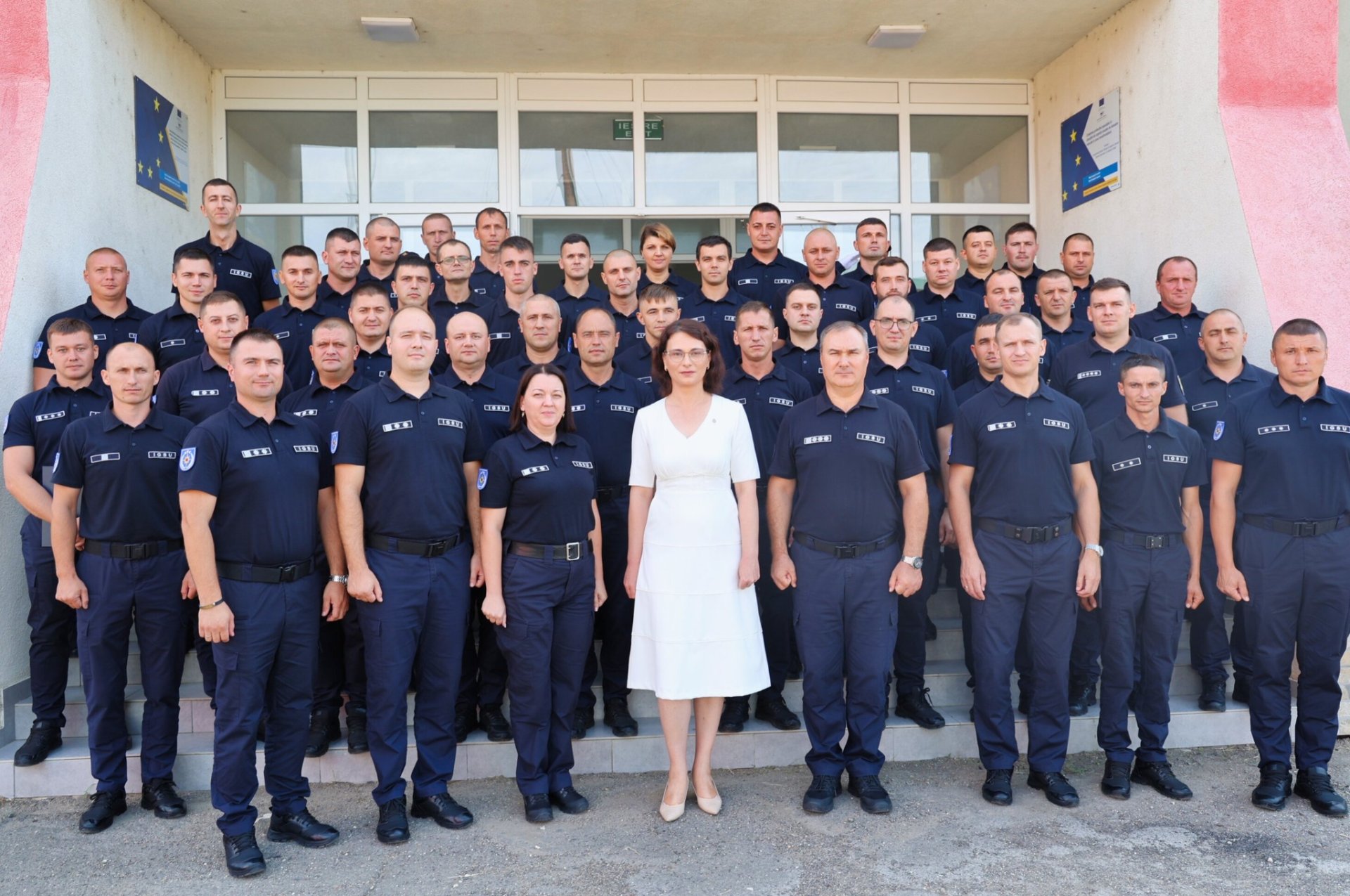
MOLDPRES: The rate of road accidents remains a worrying one, including those resulting in fatalities. One of the main reasons is drunk driving. How does the Ministry of Internal Affairs intervene to minimize the risk of accidents on the country's roads?
Daniella Misail-Nichitin: Data for the first six months of 2025 shows that road safety remains a serious challenge. Nearly 1,000 accidents were recorded, resulting in 77 deaths and 1,108 injuries. The main causes remain inappropriate speed, failure to give priority to pedestrians and other vehicles, reckless driving, incorrect turns and of course, driving under the influence of alcohol or fatigue.
The Ministry of Internal Affairs continuously intervenes to reduce risks.
I take this opportunity to again urge citizens to be responsible behind the wheel: respect speed limits, give priority to pedestrians, and do not drive under the influence of alcohol or if fatigued. Each of us's safety depends on the decisions we make while driving. Drive cautiously, protect your life and those around you!
MOLDPRES: How do you assess the current corruption index among police officers?
Daniella Misail-Nichitin: Currently, the figures show that our police officers choose integrity and professionalism. In the first eight months of this year, Ministry of Internal Affairs employees made 340 internal reports of corruption acts against them, compared to 262 in the same period last year, indicating an almost 30% increase and greater attention to respecting institutional values. At the same time, criminal cases for corruption opened against General Police Inspectorate employees decreased by about 40%, representing only 0.8% of the total personnel. The data confirms that corruption in the National Police remains minor and integrity is a conscious choice of the majority of our police officers.
I am convinced that this decrease in corruption reflects not only police professionalism but also the positive impact of using body cameras, which bring transparency and accountability to every mission.
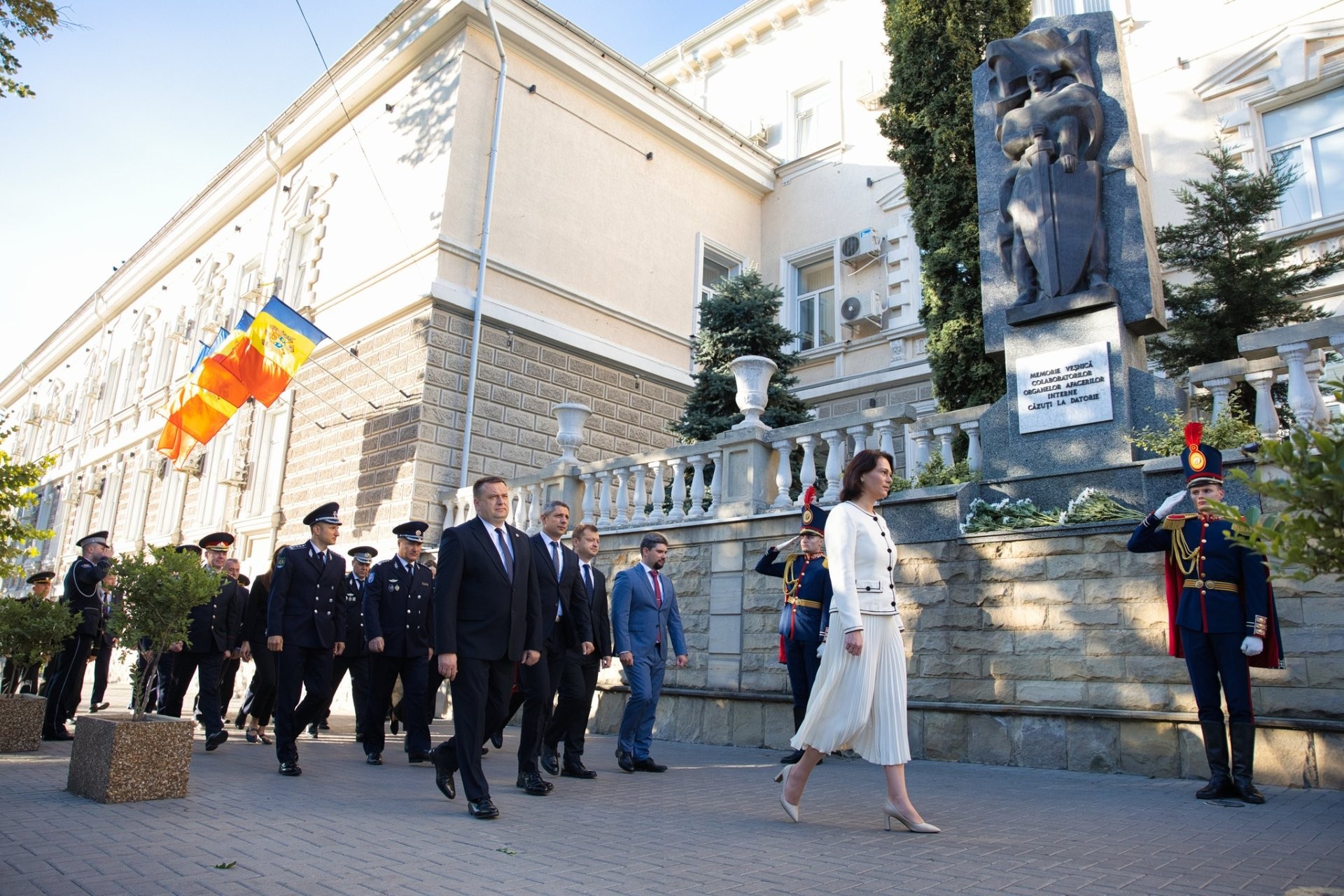
MOLDPRES: With the approach of the parliamentary elections on September 28, 2025, the National Police report increasingly more schemes of illegal funding and electoral bribery orchestrated from the Russian Federation. How do the law enforcement bodies manage such cases, and what measures are approved to counter attempts of interference in the electoral process?
Daniella Misail-Nichitin: As the parliamentary elections on 28 September 2025 approach, national authorities, including the National Police, Security and Intelligence Service, and the Prevention and Combating Money Laundering Service are on high alert to prevent any attempt at external interference in the electoral process.
We have identified internal networks of Shor criminal organization that distribute funds to bribe voters through various methods, including bank transfers, cryptocurrency payments, and cash amounts. These operations are coordinated using platforms such as the Taito app and Telegram for activity coordination.
To counter these activities, involved institutions conduct operational investigations, monitor financial transactions, and collaborate with international partners. Additionally, searches and arrests are carried out when attempts to bribe citizens are identified.
Our goal is to ensure a fair, transparent electoral process without external influences, thus protecting the sovereign will of the citizens of the Republic of Moldova.
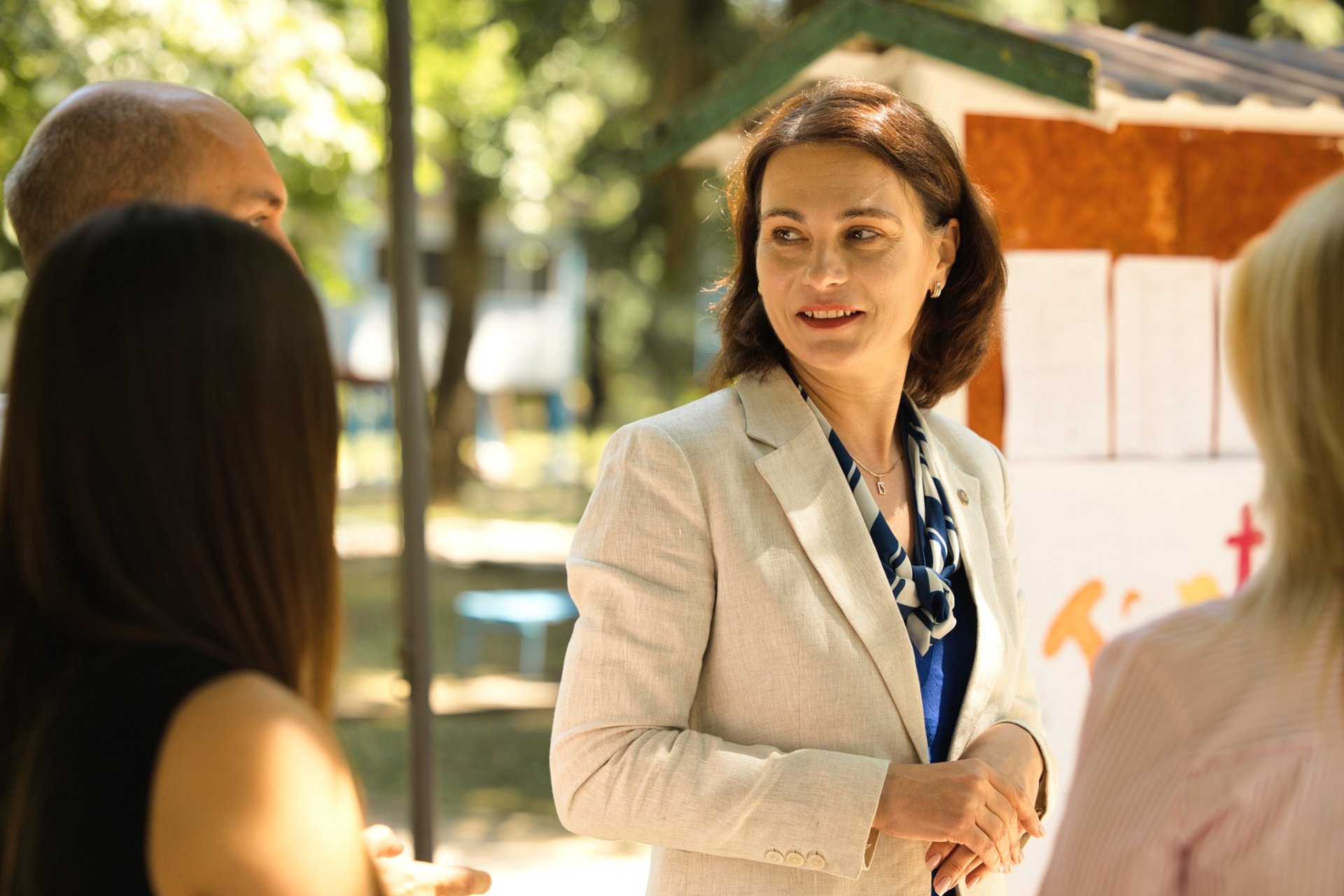
MOLDPRES: What message would you convey to citizens who might become targets of foreign influence in the context of the parliamentary election results this fall?
Daniella Misail-Nichitin: I want to speak openly, dear people, do not let yourselves be drawn into electoral bribery schemes. Do not accept money or other advantages to sell your vote or to participate in organized protests, especially if you are asked to commit violent or illegal acts.
Every vote counts, and only the responsible involvement of each of us guarantees fair and safe elections. Peaceful participation in protests is a right, but violence and disorder do not benefit anyone.
By respecting the law and refusing these temptations, you protect yourselves and those around you, and your voice remains strong and heard. If someone tries to get you to participate in illegal actions or sell your vote, call 112 immediately. Do not get caught in traps—together we protect the democracy and safety of our country.
MOLDPRES: Thank you for the interview.
Author: Ala Ciobanu
Rodica Iordanov: Investments in ecology recovering, bring visible benefits in Moldova
Interview MOLDPRES // Moldovan interior minister says ministry tries to have endowments at international standards for Interior Ministry's employees, with support of government, strategic partners
Defense Minister: Given current threats, air defense continues to hold special place in priorities for strengthening defense capabilities
MOLDPRES INTERVIEW // Moldovan deputy PM, economic development, digitalization minister says progress made in 2024 year, despite all challenges
MOLDPRES INTERVIEW/ Moldovan health minister says increase in salaries of medical system employees priority of Health Ministry
INTERVIEW // Moldova's Ambassador to Israel Alexandr Roitman speaks about challenges faced by Moldovans, exports, interpersonal relations
INTERVIEW MOLDPRES/ Environment Minister
Moldovan deputy PM says European integration not sprint, but marathon
Interview with Customs Service director: Our vision based on integration with international standards, maximum efficiency and strong climate of integrity
MOLDPRES INTERVIEW/ Agriculture and Food Industry Minister says Moldova experiences times with many opportunities
ADR North director: With EU support, North Region and whole country to transform even more in coming years
INTERVIEW // Romanian Ambassador to Moldova says his country wants Moldovan citizens to have prosperous future in European Union
EU High Level Adviser on Environment says Moldova in European Green Deal provides for overcoming challenges, turning to account opportunities, capacity of local actors
Romania's experience in EU integration process. Romanian consultant for European funds says mayors should unite to carry out joint projects
Moldovan foreign affairs minister has meeting with Secretary General of Council of Europe
Hospitalizations, 18 surgeries for severe injuries made at Moldova's Emergency Medicine Institute in last 24 hours
Parliament speaker says Moldova condemns attacks against civilians in Ukraine, which cannot be justified in any way
Deputy Prime Minister meets new PACE President: We reaffirmed firm commitment to continue close cooperation
Meteorologists extend yellow fog alert in Moldova
Ferry service at Molovata not to resume in coming weeks
Minister of Agriculture about impact of frost on orchards nationwide: We are monitoring situation
Coordinated actions to reconnect consumers to electricity
Energocom to submit request to adjust gas tariffs this week, Minister of Energy says
Number of soldiers in National Army to increase to 8,500
Government extends entitlement to social benefits for independent entrepreneurs
Authorities coordinate actions to eliminate consequences of bad weather
Moldova extends temporary protection for displaced persons from Ukraine until 1 March
Moldovan President about Russian attack on train in Ukraine: Those responsible must be held accountable
PHOTO // National Army soldiers' intervention in Strășeni district
Independent entrepreneurs to be eligible for social benefits

